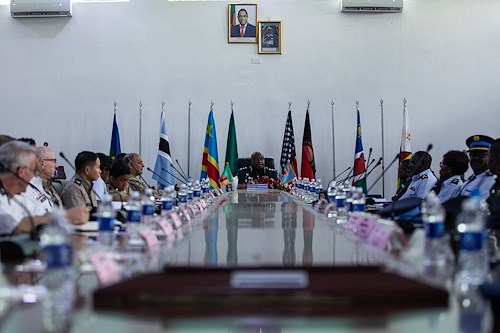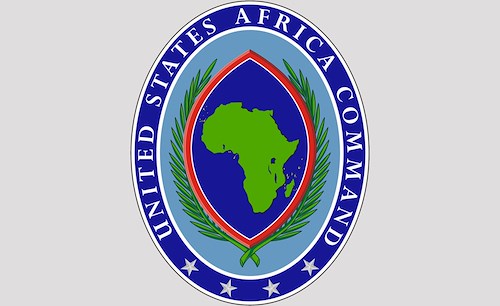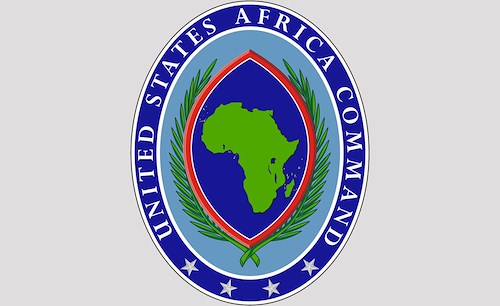More than 60 future Defense Department leaders visited U.S. Africa Command headquarters in Stuttgart, Germany, April 11, 2012, to learn more about the command, meet with senior leaders, and share their own research and recommendations on Africa-related issues.
The visit to U.S. AFRICOM was part of the DOD's Executive Leadership Development Program (ELDP), an intensive 10-month civilian education program for highly motivated DOD employees who have demonstrated outstanding leadership potential and have expressed interest in moving to senior management positions.
The course, designed to help participants gain exposure to other DOD agencies, includes monthly deployments to military facilities, combatant commands, forward-deployed locations, and other government organizations to provide an umbrella overview of the DOD and help them better understand the challenges and cultures of each of the services. Participants conduct research, write reports, and complete other homework assignments in addition to working their full-time jobs.
During deployments, the ELDP participants experience the military from a service member's perspective, training with them, participating in rigorous physical activities, and sharing the same meals. Before joining the program, participants are warned that they may be required to jump from airborne training towers, climb three-story nautical ladders, and fly in tactically configured military aircraft.
For Will Banis, of the U.S. Air Force Office of Special Investigations in Spangdahlem, Germany, it's the hands-on aspect of the program that offers him the most insight to the DOD.
"You can learn about another service, you can learn about their mission set, about their funding, how all these things operate, but unless you're no-kidding there, and you get to look somebody in the eye, you get to experience what they're experiencing, get a taste of their culture--this helps you put things in perspective."
Banis has worked for the Department of the Air Force for more than 20 years, and he noted that his view is often limited to an "Air Force lens." Experiencing the cultures of the other services has given him a greater appreciation for the military as a whole.
"When you come to an Air Force base and you're an Air Force person, it's home--it's familiar. Now you have the opportunity to go to places that are not familiar. San Diego - training with the Marine Corps. Actually standing on the yellow footprints. Knowing what it's like to get off the bus with the drill instructor in your face," he said. "It's an absolutely eye-opening experience for those who have no military background."
Ashley Bransome, chief of creative services for Defense Security Service, had no exposure to the military prior to this program. For her, spending time with service members has been one of the most rewarding experiences.
"I think the one-on-one time that we've been able to spend with the actual services has been amazing. Just to be able to sit and have lunch with them and talk. That's really changed my views on a lot of things," said Bransome, who added that she now sees the DOD budget cuts from a completely different perspective after witnessing first-hand how the cuts are affecting service members.
While in Stuttgart, participants received information on AFRICOM's mission and responsibilities in preparation for a
week-long trip to Morocco to engage with service members of U.S. Marine Corps Forces Africa. The Marines are in Morocco leading Exercise African Lion, a combined U.S.-Moroccan exercise focusing on joint and combined air and land combat interoperability missions.
Congratulating participants for their acceptance into this prestigious program, Vice Admiral Joseph Leidig, U.S. AFRICOM's deputy to the commander for military operations, offered them advice based on his experience as a senior leader in the U.S. Navy.
"The first thing you want to think about as an executive leader is what's your role in developing the vision and strategy for the organization that you're in," Leidig said, admitting it can be a difficult transition to move from the role of "doer" to leader.
"When you get to be the executive leader, try to give up the reins of the organization to the degree that you can to let other people do the work for you, so that you can focus on what's strategic."
Leidig believes successful leadership depends on personal integrity, open communication, prioritization, and assessments and metrics.
Also addressing the group was Ambassador J. Anthony Holmes, deputy to the commander for civil-military activities, who provided a comprehensive overview on the command and the importance of interagency partners in a traditionally military environment. As U.S. AFRICOM's civilian deputy, one of Holmes' major leadership challenges is to ensure that the 36 interagency personnel at U.S. Africa Command are well-represented in all of the command's approaches and decisions.
Working in a complex environment like Africa, a whole-of-U.S. government approach -- one which addresses development, defense, and diplomacy -- is crucial for success. The U.S. military, Holmes said, is a supporting player in this effort.
He also talked about the necessity and value of global partnerships in addressing African issues.
"What I try to do is break through this [perception] that it's always about us, it's about how we see things, it's about how we define the problem, it's about what our priorities are," Holmes stated. "In a profession that is all about partnerships, we do virtually nothing ourselves. We need partners in every step and every area. We need their trust and they need our openness."
Holmes told the group that he follows his intuition based on experiences throughout his career. For him, the most important criteria for an executive leader is communication and openness, which he said helps to generate trust and confidence in employees.
Rick Godin, maintenance engineer for the U.S. Navy's Submarine Maintenance Engineering, and former Marine, said that his biggest lesson was the importance of partnership between civilian and military and how they bring a balance to the DOD. He also talked about the pride he saw in each of the services they visited.
"For me, some of the highlights were to go back to a Marine Corps recruit depot and try to remember all the things that I went through, and going to see all the other services as well," he said. "When we went to Army Week, at the graduation I saw the sense of pride they have for their service is the same sense of pride that Marines have for theirs, and the Air Force, and so on."
Tacoma Anderson, housing management specialist for the Department of the Army and former soldier, described the great networking opportunities of the ELDP. "We have already established relationships and networks, not only amongst the people who sit in class with us, but with the interagencies that we've dealt with and the people who we've trained with," she said.
What stood out for her were the complexities of how the DOD operates, with so many agencies working as a whole towards common missions or objectives. Comparing the six teams of the ELDP to an Army squad with specialized skills, she said "Each of us have our own special skills that we bring, and it was our team that helped us make sure we met all the requirements, that we met the mission for each deployment, that we overcame our individual fears. It mimicked what our forces are exposed to and what they go through," she said. "This program is training us to be, in the future, the person that is going to make the decision that has immediate impact on the lives of these forces."
The ELDP group left for Agadir, Morocco on April 12, where they were scheduled take part in activities with U.S. Marine Forces Africa. They return to Stuttgart on April 15 to meet with senior leaders of U.S. European Command.
Nearing the end of the program, participants have just a few more engagements before their graduation in Washington, D.C, in early summer. While the participants faced many challenges throughout the 10 months, as they juggled work schedules, ELDP homework, and extensive travel, they were quick to point out that service members face these types of challenges every day. For many of them, this understanding was the most important take-away of the program that they said will help guide their decisions in future leadership positions in the DOD.
See also:
Executive Leadership Development Program Gets 'Electrifying' Experience during First Ever Participation in African Lion 2012 



